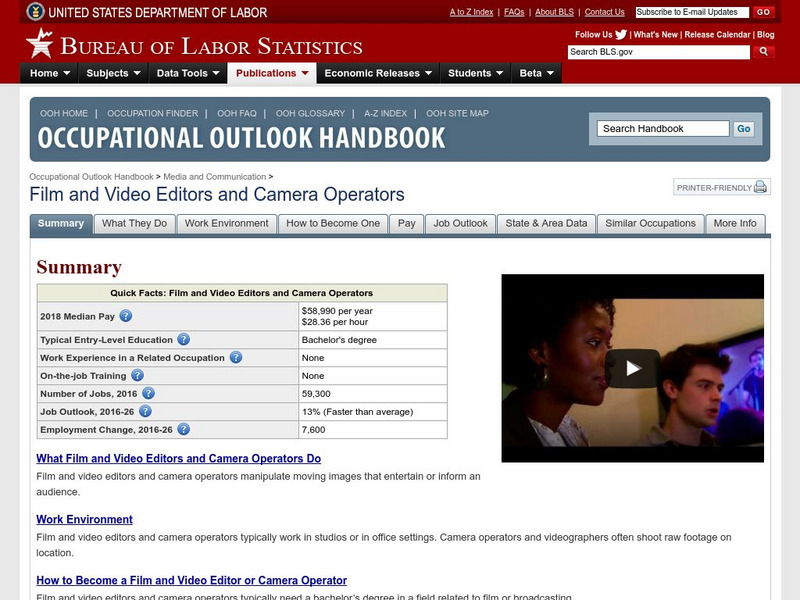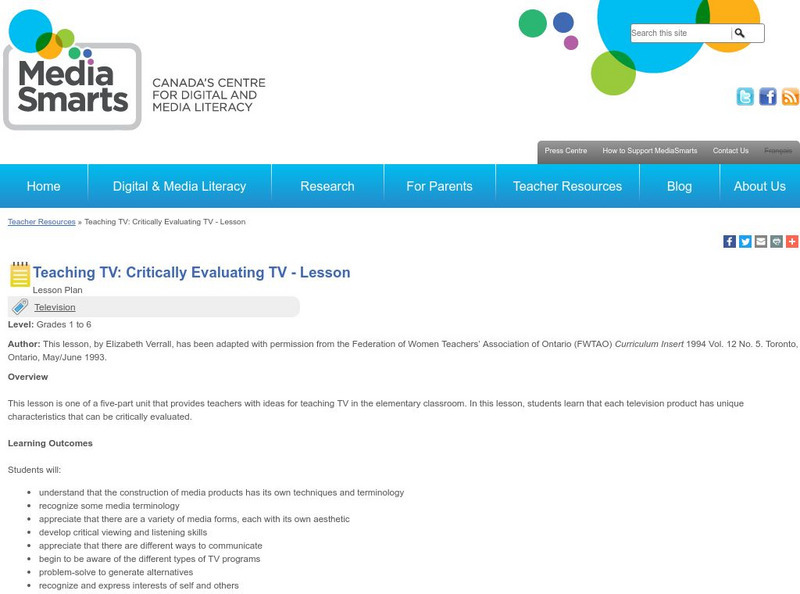Media Smarts
Images of Learning: Secondary
Make your scholars more aware of stereotypical portrayals in film and television. Discuss the definition of "stereotypes" and how they are used to present a story. High schoolers look at specific television shows and complete a chart...
Curated OER
Is TV Stronger Than Ever, or Becoming Obsolete?
The New York Times offers of two articles and two summaries for learners to consider. They read each article and then post a blog response to each of the seven related questions. The topic of the articles asks the question; Is TV...
Media Smarts
How to Analyze the News
Teach kids how to watch television, specifically the news, with this creative idea for learners of all ages from the Media Awareness Network. The elementary school plan focuses on presenting news as a story and uses Jon Scieszka's story...
Media Smarts
Cinema Cops
A study of how public perception is both reflected and influenced by film and television, this instructional activity helps students develop an awareness of audience as well as a critical view of media. Depictions of police in television...
Media Smarts
Facing TV Violence: Consequences and Media Violence
Make your class aware of the difference between media violence and real violence. Using prior knowledge, a video clip, and a worksheet, class members explore and discuss the unrealistic portrayal of violence in the media. Learners...
Curated OER
Television
Students investigate the invention of television and examine its role in their lives. They read and discuss an informational handout, list the pros and cons of television on a worksheet, and create a class pie graph illustrating the...
Curated OER
Rewrite, Revise, Recycle
Students examine different pieces of literature that have a similiar theme. They read an article about reusing ideas for television shows. They work together to create their own program proposals. They also create backstories for one of...
Curated OER
Understanding: Television
Students discuss their experiences with television. They break into small groups and go through the steps of producing a television show themselves. Their presentations are made to the entire class.
Curated OER
Literary Criticism
Young scholars evaluate and debate whether movies, television shows, and other mass media cause violent behavior in students and whether books are the same as or different from these other media in their potential for causing violent...
Curated OER
TV on Cell phones? Funny but Profitable
High schoolers explore the concept of technology. In this technology lesson, students read an article about television on a cell phone. High schoolers discuss why MobiTV was successful. Students discuss a technology and possible...
Curated OER
Television and Teens
Middle schoolers discuss the relationship teenagers have with the television. In groups, they watch different excerpts from various television shows and note every instance of violence including children. They also discuss the...
Curated OER
A La Tele
Students read a current television guide from French television. In groups, they practice and review the twenty-four hour clock and determine when a show they want to watch is on in Europe. They create a list of words they know and do...
Curated OER
McGruff's TV Violence Scorecard
Pupils watch television to identify the violence on studenT shows. They identify alternatives to settling conflicts other than in a violent manner. They share their scorecard with the class.
Curated OER
"Fast and Slow"
Students find a partner, they think about their favorite TV sport that they might like to perform in an unusual dance. They practice their chosen sport and students see if they can make a litter repeating pattern of three or four parts...
Curated OER
The First Televised War
Students view a film about the role of the media in the Vietnam War. They discuss the risks journalists face when covering a war and how the television changed how people at home saw the war. They answer questions to complete the lesson.
Curated OER
Biography: 15 Years and Counting
Learners witness the evolution of an episode of Biography from inception to final airing. They follow the procedure used for research, editing and producing the final project.
US Department of Labor
Bureau of Labor Statistics: Film and Video Editors and Camera Operators
This site by the U.S. Bureau of Labor Statistics provides very useful information on the career of a TV, video, and motion picture camera operator and editor.
Media Smarts
Media Smarts:teaching Tv: Critically Evaluating Tv Lesson
MediaSmarts provides digital and media literacy lessons for students. In this instructional activity, students will learn to watch and listen to a television with a critical lense
Media Smarts
Media Smarts: Teaching Tv: Enjoying Television Lesson
MediaSmarts provides digital and media literacy lessons for students. In this lesson, young students will become reflect about television programs they enjoy and analyze why they enjoy them.
PBS
Pbs News Hour Extra: Lesson Plan: Policing the Airways
This lesson plan looks at the current controversy of the FCC and making media outlets more accountable for what comes over their airways. In particular, the Super Bowl Halftime Show is discussed and looked at.
Other
History tv.net
This site has an archive of original photographs of important events and broadcasts in the early history of experimental television. Concentrates on the archive of photographs from Vladimir Kosma Zworykin.
Independence Hall Association
U.s. History: Land of Television
The advent of increased television programming helped create a national popular culture. Read about the many kinds of television programs offered in the 1950s.
PBS
Pbs: People and Discoveries: Television Is Developed, 1926
Gives a brief account of the inventors and developments that lead up to the creation of television.
Other
Tv Azteca Mexico
TV Azteca is a Mexican television network. This site covers their programming schedule, national news, sports, and entertainment. Using "Real Player" software, you can watch news stories and live TV from Mexico.
























